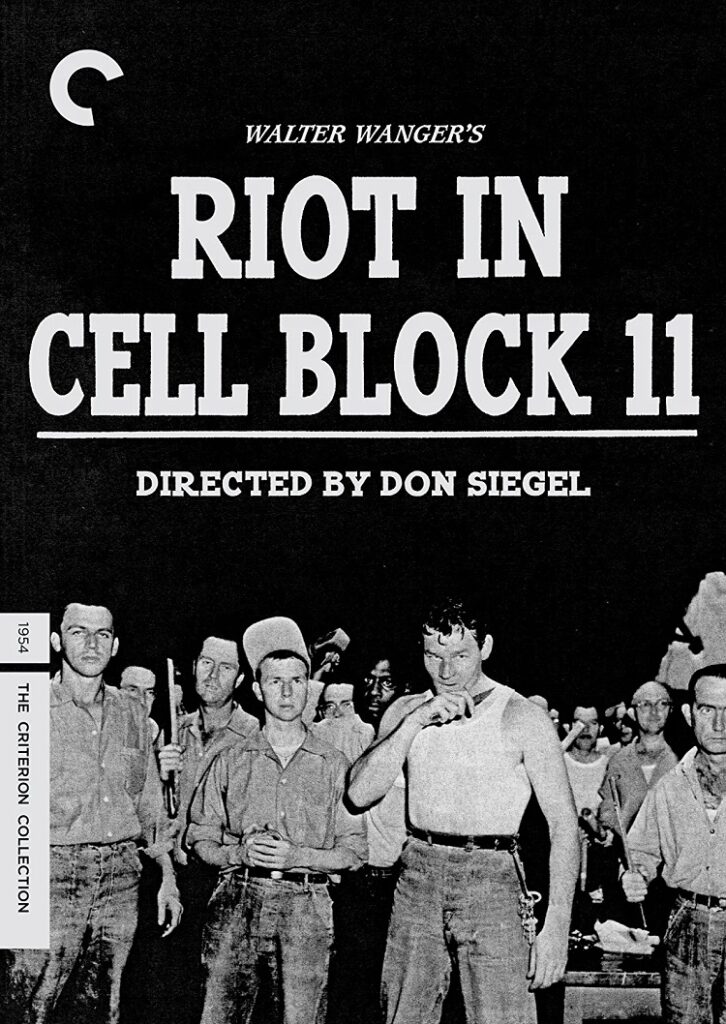
Directed by Don Siegel, the 1954 movie Riot in Cell Block 11 offers a gritty, authentic look at the prison system and the chaos behind a riot. The picture was shot in Folsom State Prison in California with several real inmates and guards filling in background roles. Producer Walter Wanger had also been in jail and relied on his experiences to charge his passion for the film.
Now presented by the good people at Criterion Collection, Riot in Cell Block 11 sheds light on an issue that still doesn’t get a lot of press. The treatment of the convicts forms the political meat on the bones of Richard Collins’ screenplay, which is at least partly based on a prison riot in Michigan in 1952.
As the picture opens, we’re told about a recent wave of prison riots brought on by poor conditions and institutional neglect. This headline soon becomes reality with inmates under the semi-leadership of Dunn (Neville Brand) take some guards captive and make demands to Warden Reynolds (Emile Meyer).
The demands of the prisoners are not unreasonable. In fact, they echo the demands of the aforementioned warden. The trouble comes when the commissioner (Frank Faylen) arrives and differs greatly with the warden as to how to handle the riot and the demands of the prisoners. This leads to an awful lot of back-and-forth between the prisoners and the government officials.
Riot in Cell Block 11 is a movie about not being listened to and the lengths human beings feel they have to go to in order to be heard. As mentioned, none of the demands made by the rioting prisoners are unreasonable. As Dunn explains to the warden near the end of the film, “You know I didn’t do it to bust over the walls…I did it just so people would know what it’s like in here.”
And as the warden explains back, at least the riots gave people on the outside an indication as to what prison is like. Making noise is often the only way to really be heard and changes are only made after the old systems of power and corruption are brought down. Siegel’s flick reveals an attempt at bringing down one of those systems from the inside.
Cinematographer Russell Harlan avoids the flashy stuff in bringing the action and drama of Riot in Cell Block 11 to life. His lens unflinchingly captures moments of startling violence, like when Dunn and two other prisoners first make a run at it and beat a guard senseless. The underpaid guards are also prone to explosive bouts of violence.
By removing any pointless embellishments and focusing on the action, Siegel weaves a tale that is as authentic as can be. The camera goes where it must to encapsulate the chaos and the viewer really gets the sense they’re inside the walls of Folsom. The tension increases in dangerous fashion, leaving simple melodrama aside.
As for the prisoners, they take a variety of positions. Some are considered the “nuts.” They should not be in general population with the other prisoners, Dunn argues. The psychopathic Carnie, played chillingly by the great character actor Leo Gordon, is an example of a “nut” who should be kept beyond arm’s length at all times.
Other convicts are moderates, like the Colonel (Robert Osterloh) and Dunn himself. As the leader of the resistance, so to speak, Brand’s character has his work cut out for him. He can’t lose face with regard to the rest of the prisoners, but he also can’t hide his sympathy with the rather generous warden’s wishes. In the end, Dunn wants what’s best.
Siegel’s Riot in Cell Block 11 does the rather remarkable job of weaving the cross-section of views into one chaotic vision without losing the purifying fire of the titular uprising. Dunn and his men want to be listened to and they’re willing to go to extreme measures to accomplish the goal. Thank god Siegel and Wanger insist that we listen.
The Criterion Collection DVD release of Riot in Cell Block 11 includes commentary by film scholar Matthew H. Bernstein along with a few audio excerpts from Siegel’s 1993 autobiography and Stuart Kaminsky’s 1974 book Don Siegel: Director. Both excerpts are read by Siegel’s son Kristoffer Tabori. There’s also an essay by Chris Fujiwara and excerpts from NBC’s The Challenge of Our Prisons radio documentary from 1953.